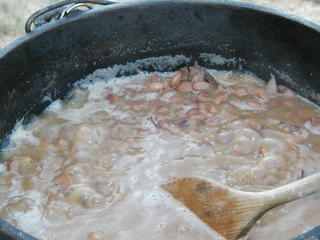Part of the reason for the extended cooking time isn't the fault of the original recipe writer. I neglected to start the second batch of charcoal briquettes in time to keep the pot going. I'm certain that I lost 30 minutes lighting the additional coals.
 |
| Southern baked beans at a lively simmer over a propane burner. |
To keep the beans cooking, I moved the Dutch oven to my propane burner. It took an additional 90 minutes to tenderize the beans.
Yesterday's experience highlights an overriding principle of Dutch oven cooking: Your dish will be done when it's done. Don't forget the impact of ambient temperature, wind conditions and moisture on cooking times. (And don't forget to light the second batch of coals on time!)
The presence of an acid is the other factor that impacts tenderness of the beans. Next time I baked this dish I plan to add the cider vinegar much later in the cooking process. I'll add the add the cider vinegar with the molasses.
Bean math
The Northwest Bean Growers Association offers these facts about bean yields:
- One #10 can of beans yields 12 cups of cooked beans, drained.
- One 15-ounce can of beans equals 1-1/2 cups of cooked beans.
- One cup of dry beans yields 3 cups cooked.
- One pound of dry beans yields 6 cups cooked.
- One pound of dry beans makes about 9 servings of baked beans or 12 servings of bean soup.

No comments:
Post a Comment